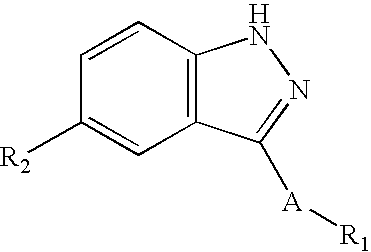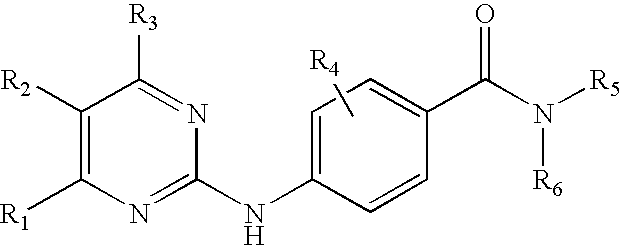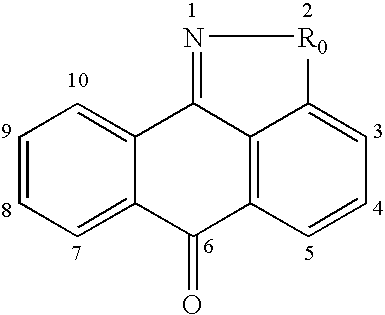Methods of using JNK or MKK inhibitors to modulate cell differentiation and to treat myeloproliferative disorders and myelodysplastic syndromes
a technology of mkk inhibitors and stem cells, applied in the direction of biocide, drug composition, extracellular fluid disorder, etc., can solve the problems of crude and unregulable modulation of stem cell differentiation, low yield of product cells, and difficult control or regulation of stem cell differentiation
- Summary
- Abstract
- Description
- Claims
- Application Information
AI Technical Summary
Benefits of technology
Problems solved by technology
Method used
Image
Examples
example 1
5.1. Example 1
Effects of JNK or MKK Inhibitors on Differentiation of CD34+ Progenitor Cells
[0432] The following assay is utilized to determine the effects of JNK or MKK inhibitors on the differentiation of CD34+ (hematopoietic progenitor) cells and the generation of colony forming units (CFU). Significantly, the assay demonstrates the ability of JNK or MKK inhibitors to suppress specifically the generation of erythropoietic colonies (BFU-E and CFU-E), while augmenting both the generation of leukocyte and platelet forming colonies (CFU-GM) and enhancing total colony forming unit (CFU-Total) production. The methods of the invention can therefore be used to regulate the differentiation of stem cells, and can also be used to stimulate the rate of colony formation, providing significant benefits to hematopoietic stem cell transplantation by improving the speed of bone marrow engraftment and recovery of leukocyte and / or platelet production.
[0433] Cord blood CD34+ hematopoietic progenitor ...
example 2
5.2. Example 2
Effects of JNK or MKK Inhibitors on Proliferation and Differentiation of Human Cord Blood CD34+ Cells
[0435] In the following example, the effects of JNK or MKK inhibitors on the proliferation and differentiation of cord blood (CB) mononuclear cells into CD34+ (hematopoietic progenitor) cells is studied. Cord blood mononuclear cells are a mixed population of cells including a small population of hematopoietic progenitor (CD34+) cells. A subset of this small CD34+ cell population includes a population (approximately 1% of total CB mononuclear cells) of CD34+CD38+cells and an even smaller population (less than 1% of total CB mononuclear cells) of CD34+CD38-cells. Significantly, the results can demonstrate an up-regulation (increased differentiation) of CD34+ cells, and inhibition or slowing down of the differentiation of hematopoietic stem cells or progenitor cells compared with positive and negative controls.
[0436] Materials and Methods: CB CD34+ cells are initiated at 4...
example 3
5.3. Example 3
Effects of JNK or MKK Inhibitors on Human Cord Blood Mononuclear Cells
[0438] Cord blood MNCs that have been cryopreserved and thawed using standard methods are isolated by standard Ficoll separation method and cultured in 24 well-plate at 0.5.times.10.sup.6 cells / ml in 20% FCS-IMDM with cytokines (IL6, KL and G-CSF 10 ng / ml each) in triplicate. The experimental groups are None (cytokines only), DMSO (1.7 .mu.L), and varying concentrations of a JNK or MKK inhibitor in DMSO. The cultured cells are harvested and analyzed by FACS staining after 1 week of culture.
PUM
| Property | Measurement | Unit |
|---|---|---|
| Concentration | aaaaa | aaaaa |
| Concentration | aaaaa | aaaaa |
| Composition | aaaaa | aaaaa |
Abstract
Description
Claims
Application Information
 Login to View More
Login to View More - R&D
- Intellectual Property
- Life Sciences
- Materials
- Tech Scout
- Unparalleled Data Quality
- Higher Quality Content
- 60% Fewer Hallucinations
Browse by: Latest US Patents, China's latest patents, Technical Efficacy Thesaurus, Application Domain, Technology Topic, Popular Technical Reports.
© 2025 PatSnap. All rights reserved.Legal|Privacy policy|Modern Slavery Act Transparency Statement|Sitemap|About US| Contact US: help@patsnap.com



